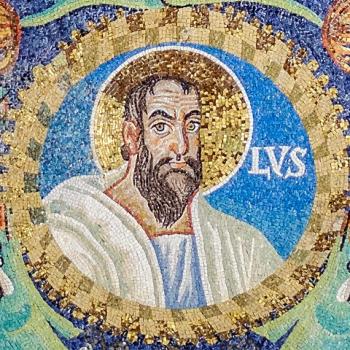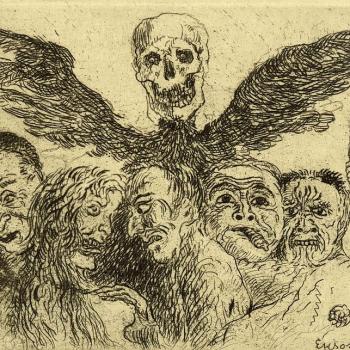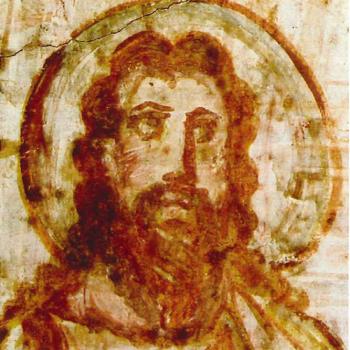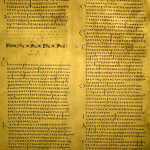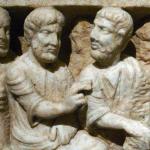 In his exile, St. John Chrysostom wrote letters to his friend and companion, the deaconess St. Olympia, hoping to inspire her and encourage her in the midst of their common trials and tribulations. She had become despondent, not merely because she had been falsely accused of setting fire to the cathedral, but because it looked like her life’s work, to make the church better, was being destroyed. Chrysostom told her to be of good cheer, to see herself in the midst of a contest, and if she proved herself to the end, she would receive a reward far greater than anything she had suffered along the way. Likewise, she should recognize that fortunes in the world come and go, but what she makes of herself, the virtue which she establishes, cannot be taken away by anyone: only she can give it up herself by sin. Yet, he was clear, she was a woman of proven virtue, a woman who had been long tested, first in marriage, later as a wealthy widow who used her good fortune to help others instead of herself. Despite her riches, she did not seek indulgences for herself: she embraced the wisdom of asceticism, going from glory to glory, splendor to splendor, so that she could likewise be seen included in the “choir of virgins” despite having been a widow:
In his exile, St. John Chrysostom wrote letters to his friend and companion, the deaconess St. Olympia, hoping to inspire her and encourage her in the midst of their common trials and tribulations. She had become despondent, not merely because she had been falsely accused of setting fire to the cathedral, but because it looked like her life’s work, to make the church better, was being destroyed. Chrysostom told her to be of good cheer, to see herself in the midst of a contest, and if she proved herself to the end, she would receive a reward far greater than anything she had suffered along the way. Likewise, she should recognize that fortunes in the world come and go, but what she makes of herself, the virtue which she establishes, cannot be taken away by anyone: only she can give it up herself by sin. Yet, he was clear, she was a woman of proven virtue, a woman who had been long tested, first in marriage, later as a wealthy widow who used her good fortune to help others instead of herself. Despite her riches, she did not seek indulgences for herself: she embraced the wisdom of asceticism, going from glory to glory, splendor to splendor, so that she could likewise be seen included in the “choir of virgins” despite having been a widow:
Do not interrupt my discourse, even if I have included you in the chorus of sanctified virgins while you are living in widowhood. For you have heard me speak often, both privately and in public, about the definition of virginity, such that no one would prevent you from being included in the choir of virgins, since you have surpassed many in that state by showing forth your great wisdom [philosophia] in other ways. On account of this, Paul set forth a definition of virginity by which he calls a virgin not someone unmarried, or someone who never had relations with a man, but rather one who is devoted to the things of God. [1]
St. John Chrysostom tells us that the good of virginity is about a kind of holiness of soul, a purity of soul, where one is devoted to God above all other things. This is harder than it sounds, and many people who seem to be virgins, due to lack of sexual relations, would not be seen as truly attaining the purity intended with virginity because they are not focused on God and the virtuous life. St Basil the Great indicated such in his own writings when he said he did not think he should be considered a virgin due to the impurity of his thoughts. Likewise, as Chrysostom indicated with Olympia, the good of virginity, what makes it something special and holy and worth mentioning, can be had by those who have had sexual relations. While the lack of sexual relations might be a sign which indicates someone is following an ascetic way of life, and so they could be pursuing a special kind of holiness, such lack alone does not constitute the holiness which is pointed to by virginity. The lack of sexual relations combined with a life selfish exploitation and greed will lead away from holiness, even though some might try to claim the title of virgin for themselves. This is why many writers warn so-called virgins not to presume holiness for themselves, and that many who they look down upon because they have had sexual relations, would be holies than them, because the concern is the purity and not the accidental signs which sometimes indicate it.
How virginity is treated and misunderstood is similar to the way some misunderstood the point of circumcision. That is, some people focus on externals, on the flesh, ignoring the true intent behind such practices, an intent which can be achieved without fulfilling the external sign. Circumcision “of the heart,” a spiritual circumcision which cuts off physical attachments which detract us from God, was what was intended by the sign of circumcision. “And the LORD your God will circumcise your heart and the heart of your offspring, so that you will love the LORD your God with all your heart and with all your soul, that you may live” (Deut. 30:6 RSV). The prophet Jeremiah likewise said, “Circumcise yourselves to the LORD, remove the foreskin of your hearts, O men of Judah and inhabitants of Jerusalem; lest my wrath go forth like fire, and burn with none to quench it, because of the evil of your doings” (Jer. 4:4 RSV). Thus, Saint Paul was not veering away from his Jewish heritage when he wrote: “For he is not a real Jew who is one outwardly, nor is true circumcision something external and physical. He is a Jew who is one inwardly, and real circumcision is a matter of the heart, spiritual and not literal. His praise is not from men but from God” (Rom. 2:28-29 RSV).
Virginity, like circumcision, has a spiritual side, which can be had by those who are not physically virgins, while those who are such physically can be said to be far from what was intended by the sign. The sign does not necessarily indicate someone is holy or filled with grace, nor does the lack of the sign indicate the lack of such grace. Someone who has been sexually assaulted does not lose their integrity from the assault (whether or not they fight back). Virgins who die as a result of their attackers would still be considered virgins no matter what their assaulter has done to them: likewise, virgins would remain such even if they do not die at the hands of their attacker, for what happened to them by their abuser was not their fault and did not change who or what they are. Likewise, those who lost their spiritual purity, can once again regain it: this is, after all, the message of the Gospel: Christ saves us, restoring us with his grace – indeed, he does far more, as he raises us up beyond ourselves, deifying us with our union with him. St Gregory of Nyssa, therefore, explained:
We see this even here, in the case of a mirror, or a sheet of water, or any smooth surface that can reflect the light; when they receive the sunbeam they beam themselves; but they would not do this if any stain marred their pure and shining surface. We shall become then as the light, in our nearness to Christ’s true light, if we leave this dark atmosphere of the earth and dwell above; and we shall be light, as our Lord says somewhere to His disciples , if the true Light that shines in the dark comes down even to us; unless, that is, any foulness of sin spreading over our hearts should dim the brightness of our light. Perhaps these examples have led us gradually on to the discovery that we can be changed into something better than ourselves; and it has been proved as well that this union of the soul with the incorruptible Deity can be accomplished in no other way but by herself attaining by her virgin state to the utmost purity possible — a state which, being like God, will enable her to grasp that to which it is like, while she places herself like a mirror beneath the purity of God, and moulds her own beauty at the touch and the sight of the Archetype of all beauty.[2]
The glory of virginity is the purity involved in it and not the absence of sexuality. It cannot be taken away from us by force. If we suffer at the hands of someone else against our will, we do not lose our integrity. Likewise, even if we at one time lose it due to our own will, and we travel along wayward paths away from virtue, we can find it returned to us thanks to the grace of God. He is able to heal and restore us to spiritual purity. Those who like to focus only on the external sign can fail to achieve that purity as they glorify themselves instead of God. The focus should never be about the sign and the externals, but about the spiritual transformation happening in our lives. We should all seek the purity of the grace of virginity no matter what walk of life we have, and we can all be called to join in the choirs of virgins if we attain it. St. John Chrysostom, in writing to St Olympia, reminded her of this, and in doing so, helps us transcend the “fleshy” letter of the law and look to the spirit which truly brings life.
[IMG=St. Olympia on the colonnade of St Peter’s square. Photo by Alf van Beem [CC0], from Wikimedia Commons]
[1] St. John Chrysostom, Letters to Saint Olympia. Trans. David C. Ford (Yonkers, NW: St Vladimir’s Seminary Press, 2016), 62-3 [Letter 8].
[2] St. Gregory of Nyssa, “On Virginity” in NPNF2(5):356.
Stay in touch! Like A Little Bit of Nothing on Facebook








